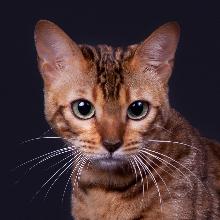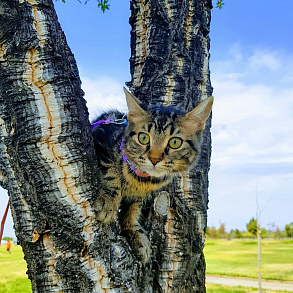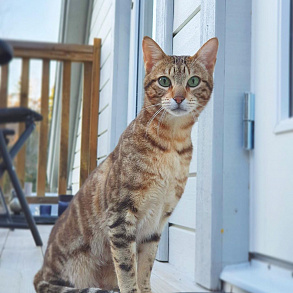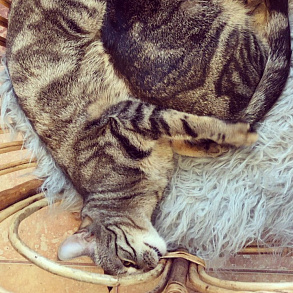Sokoke

Sokoke is an ancient breed of cats native to Kenya. Gentle and amorous, but very freedom-loving.
Brief information
- Breed Name: Sokoke
- Country of Origin: Kenya
- Weight: 3 – 5 kg
- Life expectancy: 13 – 16 years
Sokoke is an active, playful and independent cat from Kenya, which delights with its wild primeval beauty and predatory grace. Externally, the breed resembles a very small cheetah. The main feature of sokoke is an unusual color resembling a wood pattern, which varies from beige to black. Any hair on the skin has light and dark stripes, it looks as if one color is "powdered" by another
Breed characteristics
History
Cats of the Sokoke breed are as similar as possible to their wild counterparts. We can say that this is a cheetah in miniature.
Such cats have lived for many years in the forests of Kenya (mainly in the Sokoke region). These wild animals were called hudsonzo. They usually lived in trees, fed on insects and birds, which they chased by jumping from branch to branch.
In the 80s of the last century, an Englishwoman, Janie Slater, while in Kenya, at first just sheltered two hudsonzo cats, and then organized a nursery for their breeding, giving the cats a name after the name of the province where they come from. A friend of Jani Slater was engaged in transporting cats to Denmark.
In 1983, this breed was given the official name African Shorthair. And sokoke was recognized only ten years later, first in Denmark, and then in other European countries.
In Russia, sokoke are practically not found. Most likely, you will have to buy a kitten in one of the European countries.
Appearance
- Color: marble tabby, wool color can be any.
- Ears: large, set high, preferably at the ends with tassels.
- Eyes: expressive and large, able to change color depending on the mood of the cat (from amber to light green).
- Coat: short and shiny, the hairs fit snugly to the body, the undercoat is not developed.
Features of behavior
By nature, sokoke is an active, playful and independent animal. These cats can easily adapt to life both in a private house and in an apartment. But it should be remembered that their ancestors are still used to the freedom of Kenyan forests, so if Sokoke lives in an apartment, then you need to take care of the availability of a plot with trees near the house, where the cat can climb and jump on the branches for fun. The Kenyan forest cat will not be able to adapt to the stone jungle of the metropolis.
Sokoke is not only an excellent tree climber, but also an excellent swimmer. She perceives water as an additional entertainment.
Kenyan forest cat easily gets along with other animals in the house. She knows how to find a common language with both cats and dogs. Sokoke quickly become attached to the owners. By nature, they are very gentle and amorous, despite their wild appearance.
Health and Care
Sokoke has a short shiny coat that fits snugly to the body. In order for it to maintain a healthy shine all the time, it needs to be combed thoroughly regularly. It is recommended to perform this procedure at least once a week. It is advisable to choose a brush made of natural bristles so that coarse artificial fibers do not damage the cat's skin. Rubbing it with a piece of suede, fur or silk will help to add shine to the wool.
Otherwise, you can adhere to standard care — regularly brush your teeth, ears, tear tracks, bathe once a month using a special shampoo. Since sokoke love water, bathing for them is not a painful procedure, but a pleasure.
Kenyan forest cats naturally have good health. But they also have the standard sores of cats spending time outside — cuts of paw pads, infections, viruses, parasites, etc. In addition, representatives of this breed are prone to nervous disorders. Sokoke are easily excitable, as well as prone to hysteria and neurosis, cats of this breed also have meningitis and seizures. Most often, nervous disorders are hereditary diseases. Therefore, when buying a kitten, it is important to look closely at his mother.


